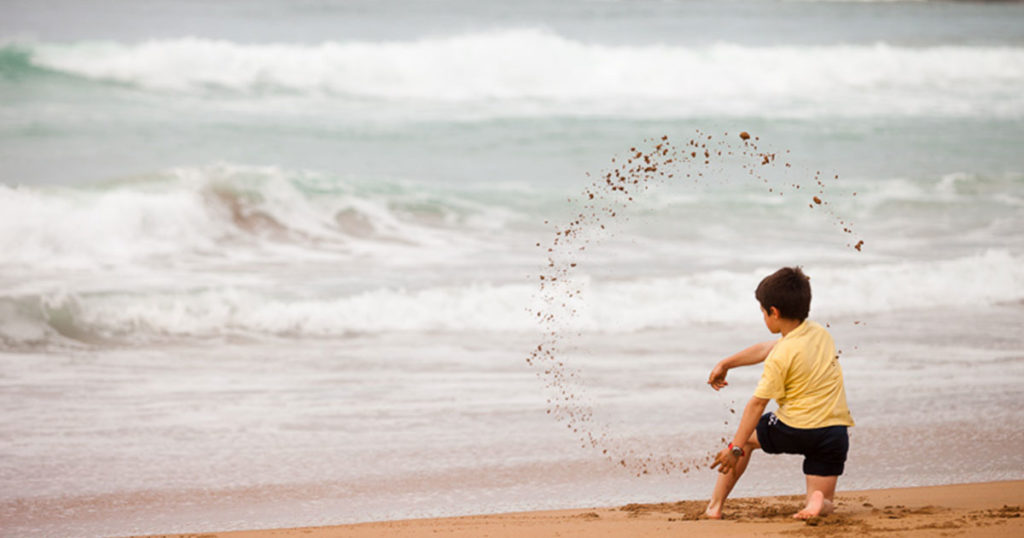
Rodiles Beach is half an hour from my home. I’d planned to take my mother there in August, when the water was still warm and inviting, but we didn’t manage to get to the beach until an afternoon in mid-September when my brother was visiting from Madrid. As we three drove over from my house, my brother reminded us of a game we’d played on family car trips when he and I were children. It’s a guessing game for a pair of rhyming words making a description, such as far star. “Distant heavenly body” might be the hint. “Thin stripe” for fine line. You are also given the number of syllables for each word: a hink-pink is a rhyme with one syllable for each word; a hinky-pinkity is two syllables for the first word and three for the second. My brother gave us one. “Water movement,” he said. “It’s a hinky-pinky.” My mother eventually got it, but not immediately: we were distracted by the houses, the hills, and the view of the estuary. And then we arrived.
The day was warm and sunny, but September warm, not August warm, and though my mother walked down to the water’s edge, she declined to go in. I’d have stayed out too if not for my brother, who said he couldn’t go back to Madrid without an ocean dip. When he stepped in, I followed. Side by side we waded out, gradually becoming accustomed to the chill, which wasn’t so bad after all. Step by step we went. Ankles, shins, knees. Thighs. We turned and waved at our mother behind us on the sand. Hinky-pinky. Half-submerged adieu. Thigh-high goodbye. Onward. With the water waist-high, we took the plunge on the count of three.
The routine of wading into the water together, counting, and then immersing ourselves at the same time was reminiscent of childhood. It called up no particular shared moments from our past, but suggested the fine conspiratorial adventures, big or small, that children seem to have the best of. A few days earlier, my mother had come across a photo on a shelf at my house that my father had taken of my brother and me on a family camping trip when we kids were about six and eight, one of several such family trips from our preteen years. That photo, a small, two-inch square of mostly gray paper, has been floating around my life for years. Like a scrap of driftwood, it bobs along, catching on a shelf or getting lodged in a book. Then it slips free, and I come across it somewhere else. It is the small size it is because my father printed it in his darkroom to test different exposure times and bath solutions, possibly when he was teaching me darkroom technique. In the photo, my brother and I face the camera, he behind me, his hands on my shoulders, head atilt and sweet silly grin on his face, hamming it up, while I, with a smile showing missing front teeth, look up in happy expectation. What would those two have been thinking of once released from the camera? Of the minnows in the stream they would try again to catch the next day, or the return trip home, or the pleasures of a pending visit to grandparents, but not of a summer ages hence when they would reunite on a beach in Spain, in distant adulthood. They’d have had no idea what that might be like. But then, I can’t really imagine the equally distant waters of childhood we splashed about in. Were they deep, were they wild, how many pockets of pleasantly warm water and how many of cold? And on emerging from childhood, did we feel we’d made it safely, or that we had been left high and dry? Was it like washing up on a foreign shore?
After 15 minutes of slow, leisurely swimming, side-by-side, talking as we moved through the water, I was beginning to feel chilled, and we turned and swam together toward the beach. Our progress was helped by the waves rolling in, and then hampered by the undertow that momentarily stopped all forward movement before another wave pushed us on. A rougher ocean might have taxed us considerably. Hink-pink, dangerous waves. Fell swell.
We hadn’t held hands walking down Rodiles beach into the waters of the Bay of Biscay, nor did we as we emerged, but we might have if we’d paused to think of the miracle of landing together, whole, on this beach on this afternoon, after so many years of currents and tides and eddies, advances and setbacks, waves and troughs, rough weather and balmy days. It was not a spectacular day, but we experienced it together, despite the different channels we have followed in our lives. We’ve kept up. We’ve had our lives together, as brother and sister, though swept along almost willy-nilly by the ocean motion.

